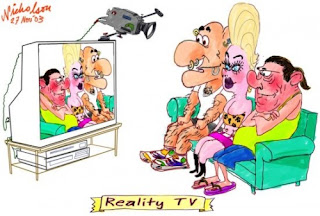People clamor to it on a daily basis. They will hold fireside chats to go over the events that occurred on it. They will even mitigate work productivity for the sake of discussion about it. Water cooler chatter? This will actually control the subject matter of those discussions. Entertainment Tonight is always abreast of the behind the scenes workings of them. If you checked a Twitter or Facebook, you will get real time updates about what is occurring while they are on. It seems as if, nowadays, there is nothing more compelling and more real than…
the reality show.
Yes, that is right. I just said “the reality show”. You know, the makeshift aberration of TV programming that is subdued by our everlasting desire to be voyeurs into others’ lives rather than navigators of our own? You know the one device that may have turned talentless botox laden bodies into stars without showing anything remotely close to talent? Don’t we all understand how we watch the one programming that has turned music channels into nosy stations of onlooker tendencies? If you identify with any of those questions, then you know exactly what I am talking about.
Now it is time to get into the chocolate covered lie: there is nothing wrong with some good, engaging reality television.
This may rattle some bones and jar some attitudes. I don’t care. I bring truth, not a bunch of manufactured yuletide greetings to make you feel good.
Why We Are Compelled
There is concrete reasoning behind why we watch reality television. Ohio State University psychologist Steven Reiss has this to say:
Reiss's data showed that the largest significant motive for watching reality television was social status, which leads to the joy of self-importance. Only slightly less strong was the need for vengeance, which leads to vindication. "Some people may watch reality TV partially because they enjoy feeling superior to the people being portrayed," Reiss said. "People with a strong need for vengeance have the potential to enjoy watching people being humiliated." [1]
This piece of information is saying a lot. In actuality, there are 16 different “joys” that Reiss was referring to [2]. However, social status/self-importance and vengeance/humiliation were the prominent joys. Thus, it can be safe to say that people watch these shows to feel better about their selves and to downplay others.
Good grief. And I thought we were going to escape schadenfreude. I guess not.
Even more apparent, and shocking for some, is our everlasting enjoyment for “humilitainment” (humiliation + entertainment =…well, you figured it out). What happens is that their episodes of shadenfreude come across because people began to enjoy the humiliation and self-deprecation of others [3]. People will find that special joy in the crass actions of making others look dreadful. Waite even noted that this could be especially dangerous if we “expect it's OK to humiliate and to be humiliated by others, instead of thinking there's something wrong with this behavior” [4]. So, if you notice that there is a lot of cursing on The Real World, another fight on Love and Hip Hop, or some blunder on The Biggest Loser, don’t be alarmed: most of you want it that way.
The Health Issue with Reality TV
There have been some health related concerns when it comes to reality television.
For one, there are certain aspects that tend to be the antithesis of how healthy relationships should be. During a 2002-2003 study by the Parents TV Council, there were 4.3 instances of sexual interaction per hour, a 169% increase from the previous year [5]. Judging how society has responded to this, that fact isn’t surprising. There has also been a 43% increase in the use of foul language, which tends to also be sexually related [6]. Just goes to show us: even in reality TV, sex sells.
Sometimes, even the “healthier” reality shows send mixed messages. Shows like the “The Biggest Loser” and “Extreme Makeover” are great at showcasing the cosmetic side of losing weight, but they come short-handed at making people realize the health benefits that are associated [7]. People began to only see how losing weight and being healthy makes them “look good”, not “live good”. In addition, the messages that should be sent about weight loss and plastic surgery are lost to the good nature idea of “success” [8]. In the end, people care less how these people achieved results if they went from slob to heartthrob that found a job.
Lastly, there is the issue with substance abuse. Many shows, like “The Real World”, show regular smoking and consumption of alcohol as the regular for people [9]. There are times when these same programs will show you the harms of such behaviors. However, the juxtaposition of positive and negative messages about these behaviors can eventually send mixed messages to the viewer [10]. It does make sense that all of that partying and drinking seen on Jersey Shore becomes a modus operandi for people of that age or younger.
Conspired Consciousness
An even bigger issue is that many of the shows are watched by kids and preteens. While some think that is okay, research has said otherwise:
Pediatrican Victor Strasburger, co-author of a leading book on adolescents and the media, noted in an interview for this paper that RTV poses a particular risk to 8- to 15-year-olds, who are seeking and absorbing guidance for their rapidly evolving sense of personal identity as well as their relationships with family, friends and the opposite sex. Moreover, because children and adolescents may be less likely than adults to see the contrived nature of reality shows, they are more likely to take the messages at face value. [11]
Now we have to understand that children don’t understand the nuances of the world like we do. They aren’t able to tell that Bruce Jenner is acting like an emasculated rag doll of a man because it practically boosts ratings. They also don’t understand that Flavor of Love is more talent showcase than a search of romance.
Even bigger than this is whether or not these shows influence bad behavior. Certain shows can contribute to the “mean girl syndrome”, like the lavishly extravagant “My Sweet 16” or the over-the-top trollop trump “Mean Girls Club” [12]. Females see this type of life and behavior, thinking that this is how people are supposed to act and live. Even worse, these behaviors are carried off into school where bullying becomes rampant [13][14]. In the end, these reality shows can, and actually tend to, have a negative effect on how people behave.
The Skinny
Reality TV may not be real, but their effects upon society are. People become more concerned with outer appearances and less concerned with the truth behind them. Also, there is an aberration of how substance abuse is viewed and handled. In addition, behavioral concerns are at an all-time high because of these shows.
So the next time you see Somaya Reese spaz out with her Salvadorian accent, Chrissy Lampkin fighting Kimbella Vanderhee, exposing Kimbella’s lack of underwear, or Snooki sitting in a fridge/freezer to cool off her derrier, please know that all of this “entertainment” is having a lasting effect on society.
Where is The Cosby Show and A Different World when you need it? Oh, yeah. Those type of shows cost too much.
‘Nuff said and ‘Nuff Respect.























